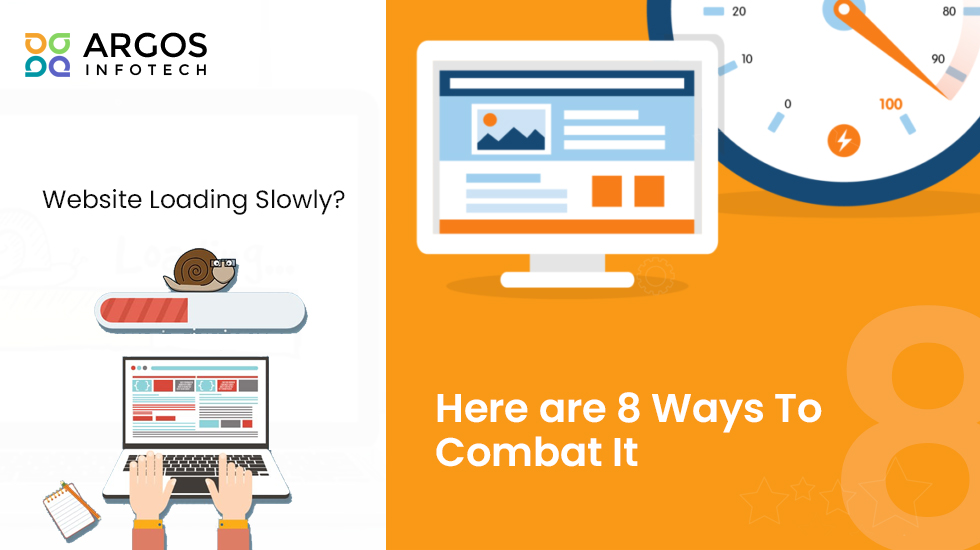You just got your website designed by a website designing company and everything looks perfect- the design, the look, everything. But, anytime someone opens it for the first time, they have to wait a long time for it to load. That’s when all else fails. Many businesses ignore how important website loading speed is.
Let’s first discuss the major reasons your website could be slowing down:
What makes your website load slower?
Heavy coding
Anything sizable and dense will impact your website negatively. This is not just limited to web elements, but also the coding. Yes, many large companies indeed have millions of lines of code but what they focus on is cleanliness. Loading time can be impacted by unnecessary lines in the code like empty lines, extra white spaces, etc.
Server
The word “server” has a deep meaning and background behind it. It is what matters the most. If your website’s server is not performing as demanded, it will make the website load slowly. Usually, the key reason behind this is the web host. If you opt for cheaper web hosting, they could also provide a shared server.
Another thing about servers is the location they’re in. For example, if someone is visiting your website from India and at the same time from the US, but your server is located in India. The user from the US will face a long wait before your website loads.
Ads
Yes, it is important to find ways to monetize your website but knowing where to stop is mandatory. The website speed is also affected by the advertisements being displayed since more ads request more HTTP requests.
Traffic
A web server can only take so much. If the traffic increases more than it can handle, it’ll remarkably lower the speed. The website may even crash beyond a point and it will not be good in the long run.
How to make your website load faster?
Now that you’ve understood the key reasons for making your website slower, here are some tips for making your website load quickly:
1. Reduce HTTP requests
The larger the number of elements on your website, the greater the HTTP requests. For each part of a web page, an HTTP request is made making the website load speed lower. The best way to combat this is by focusing on minimalist web design and development. Ask your web development company to analyze the number of requests it currently makes and then evaluate the necessary elements.
2. Performance-optimised hosting
Unlike a basic hosting platform, several performance-optimized hosting platforms for your website could help in page loading speed. This might cost you higher temporarily as compared to shared hosting but it will give your customers the experience they deserve. These website development services are provided by top companies only.
3. Compress your image files
Yes, image files make your website look stunning and give it an amazing vibe. However, these images could be the reason your website is loading slowly. To compress images on your website, you or your website designing company can use several optimization plugins. These include tinypng.org, WP Smush (if you’re using WordPress), and Squoosh.
4. Web Page Caching
Web page caching is probably the most effective way to reduce loading time. When a web development company designs a website or web app and opts for caching, it minimizes the server’s efforts. It copies the site’s files, reducing the Time to First Byte remarkably. You can either use a plugin that could help with caching or you could let the web host handle it for you.
5. Minifying
Your code is a huge contributor to the website speed as we mentioned above. The best way to handle this is by minifying your JavaScript, CSS, and HTML code. You can either manually evaluate every line of code or use free plugins as well. As a website designing company, one must focus on minimizing unnecessary spaces, characters, comments, and more.
6. Deactivate Unnecessary Plugins
Yes, plugins are extremely helpful but no, you don’t need too many of them. If you’re using a pre-built website theme, there is a chance that there are several unnecessary plugins installed. Take a look at all the plugins your website has. Some of them may be fine but some may be outdated and the reason why your website is slow. In the initial stages of the web design, you can try deactivating the plugins to check if they make a difference. Old and outdated plugins might also not function properly and can be a security threat as well.
7. Opt for a Content Delivery Network (CDN)
CDN is a network of servers located globally that could help in reducing your web page speed. Along with your host, it distributes copies of your site’s files to carefully chosen data centers across the globe. This helps lower the TTFB (Time To First Byte) by minimizing the distance between the browsers and the host’s servers.
8. Asynchronous Loading
While this may sound very basic, it is something that could have a huge effect on the overall speed. Your CSS and Javascript files load in two ways – synchronously and asynchronously. When they load synchronously, they load all at a time. On the other hand, when it load asynchronously, they load simultaneously. Opting for synchronous loading will mean that the user will have to wait for the entire page to load, decreasing the speed.
To ensure that your website reaches its desired users, website loading speed is of utmost importance. You can make use of tools like Google Page Insights to calculate the speed and then work on the required points.
If you’re looking for an expert, feel free to reach out to us.
